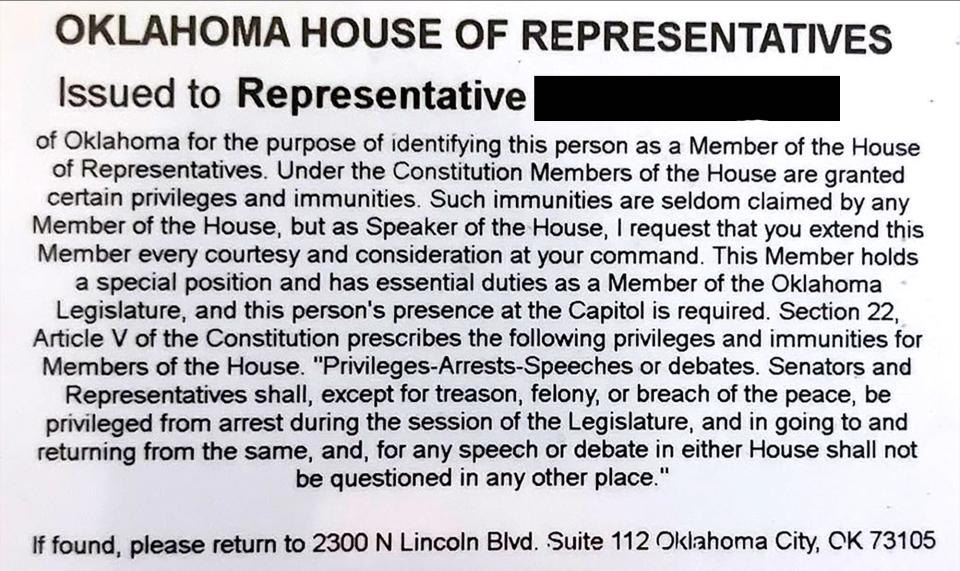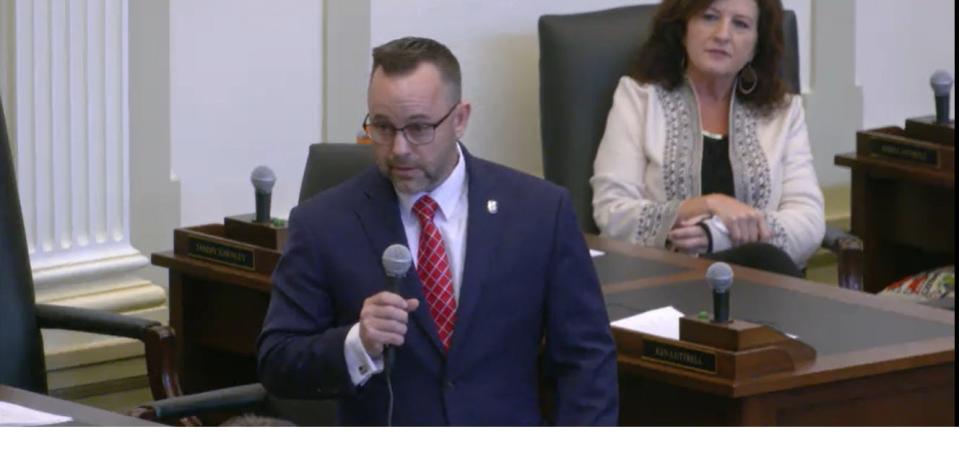Oklahoma Rep. Dean Davis claimed 'legislative immunity' during his arrest. Are state officials really exempt?
- Oops!Something went wrong.Please try again later.
The circumstances and fallout regarding the arrest of Oklahoma Rep. Dean Davis (R-Broken Arrow) have generated heated discussion about constitutional privileges for lawmakers and what the exact boundaries of the protection are.
Davis was censured by the Legislature after insisting to police that they were constitutionally prohibited from arresting him while the Legislature was in session. But the debate continues, centering around language in the Oklahoma Constitution that prohibits a legislator from being arrested under certain circumstances.
Experts and historians say the original intent behind the provision is to allow lawmakers to work freely and independently fulfilling their duties without threat from other branches of government or agencies of the state. But Davis' recent attempted use of the provision reignited debate over whether he himself had abused the concept of "legislative immunity."
Previous: Oklahoma House censures representative who claimed police couldn't arrest him
What is the privilege listed on legislators' ID cards?

During his arrest early March 23 at a bar in Oklahoma City's Bricktown entertainment district, Davis presented his legislative identification card to police, asking the arresting officer to read from it aloud. The House of Representatives ID included a provision from Article 5, Section 22 of the state constitution, which states:
"Senators and Representatives shall, except for treason, felony, or breach of the peace, be privileged from arrest during the session of the Legislature, and in going to and returning from the same, and, for any speech or debate in either House, shall not be questioned in any other place."
Body camera footage released by police shows that, after reading the card, the arresting officer told Davis he was not at the Capitol and that he was still going to arrest him on complaint of public drunkenness. Davis demanded to speak to the officer's superiors, but the decision was made for the officer to proceed with the arrest, and the city's chapter of the Fraternal Order of Police released a statement in support of the officer's action.
What do experts say about legislative immunity?
Arrest reports say Davis "became argumentative" when asked by officers to leave the bar after 2 a.m., and police footage shows him insisting he could not be arrested because legislators were in session. Several legal and political experts, however, dispute various aspects of Davis' argument.
"In my opinion, a legislator is immune from arrest during the time when the Legislature is actually in 'session,' dealing with official business," said Bob Burke, a constitutional lawyer and author. "I do not think it means at any time during the four months of what we call a legislative session from February to May."
"The men who created the (state) constitution at the Constitutional Convention in Guthrie were concerned about law enforcement arresting a legislator on his way to debate or vote on a pending piece of legislation," Burke also said. "There is nothing sacred about the constitutional provision that would prevent a law enforcement officer from arresting a legislator for an alleged violation of law when such action is not remotely related to a legislator's performance of his legislative duty."
James Davenport, a political science professor at Rose State College and a former 2010 candidate for the Oklahoma Senate, said the provision is meant to protect legislators from political retaliation, not to excuse any types of behavior from them.
"'Felony' and 'breach of the peace,' especially 'breach of the peace,' is a pretty broad category there," Davenport said. "The way I would read that, and I think the way most people would read that, is if a representative is engaged in behavior that is disruptive of the public peace, or is causing a disturbance in the public, then they could be arrested. So it seems to me that trying to use this as a 'Get Out of Jail Free' card, so to speak, is not the way the language was written."
Burke agreed, saying that misinterpretations of the provision would suggest that a legislator could be "untouchable" for crimes like assault or murder during a four-month period, which is unreasonable.
"(Davis') position would lean one to believe that you can commit any crime you want to, from the first Monday in February until the Legislature adjourns," Burke said. "Carried to its extreme, that's what that position is, and that could not have been what the delegates for the constitutional convention meant."
Is there any past precedent on a 'legislative immunity' in Oklahoma?
If a legislator were to cite the provision as a defense in a criminal case, it would not be on solid grounds.
"I have not heard of a case in which a member of the Legislature had been arrested and then taken to trial or arraignment and it gets thrown out because of this provision in the (state) constitution," Davenport said.
A 1977 Oklahoma Supreme Court decision, Howard v. Webb, ruled that Oklahoma's legislative immunity provision "encompasses only arrest on civil process. Since no crime comes within the purview of the privilege, there can be no privilege from arrest for even the most minor criminal offenses."

What's next for Rep. Dean Davis?
Davis was booked into the county jail on complaint of public drunkenness early Thursday but was released on his own recognizance soon afterward. When he appeared on the House floor later that day, he disputed any wrongdoing but apologized for the "unnecessary distraction" his arrest created for the legislative body.
The debate for House Republicans on whether to censure, or formally condemn, Davis hinged on if they felt he should be censured for an incident that happened outside of the Capitol.
Ultimately, the House formally voted Monday to censure Davis by a vote of 81-9, stripping him of his committee duties until he issued a formal apology to authorities and fellow lawmakers. Davis was not present for the motion.
"Actions have consequences," said Oklahoma Rep. Anthony Moore, R-Clinton. "As elected officials ... we must hold ourselves to the highest standard. And while we are not in a court of criminal law here, the purpose of this motion is to maintain the character and integrity that our constituents expect and that our constituents deserve."
Among the "no" votes against Davis' censure was Oklahoma Rep. Mauree Turner, D-Oklahoma City. Turner was censured earlier this month after House Republicans accused them of blocking state troopers from questioning a transgender rights activist who'd allegedly assaulted an officer during a protest. Turner has not been charged with any crime.
"People should not be reduced to the worst moments that they have had to live through," Turner said. "They should be wrapped in community. They should be wrapped in care. So ... even though he voted to censure me, I think censuring the representative is an act that we probably shouldn't do."
But Oklahoma Rep. Cyndi Munson, D-Oklahoma City and House minority leader, expressed surprise that the Broken Arrow representative had not already been censured earlier.
"It is known that this isn't the first time the Representative has been arrested on charges related to intoxication and has attempted to use his position as an elected official to avoid facing consequences," Munson tweeted Friday. "It appears he needs to seek help for substance abuse. And I sincerely hope he does."
Monday's censure motion did not indicate what further disciplinary action, if any, would be pursued against Davis, and House Republicans said they were hopeful Davis would return to carry out his duties, pending his apology.
But the state constitution says that "drunkenness and the excessive use of intoxicating liquors while in office shall constitute sufficient cause for impeachment or removal therefrom."
This article originally appeared on Oklahoman: Could Rep. Dean Davis in Oklahoma really claim legislative immunity?

